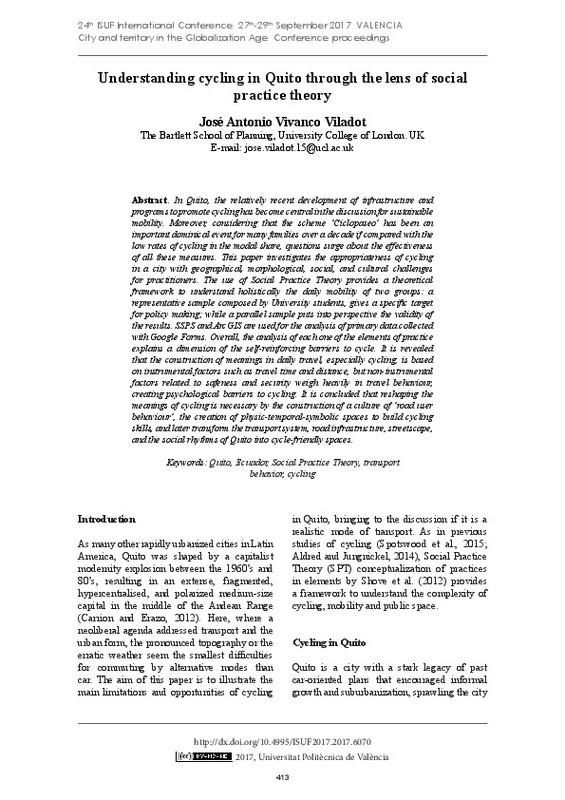JavaScript is disabled for your browser. Some features of this site may not work without it.
Buscar en RiuNet
Listar
Mi cuenta
Estadísticas
Ayuda RiuNet
Admin. UPV
Understanding cycling in Quito through the lens of Social Practice Theory
Mostrar el registro sencillo del ítem
Ficheros en el ítem
| dc.contributor.author | Vivanco, José Antonio
|
es_ES |
| dc.coverage.spatial | east=-78.46783820000002; north=-0.1806532; name= Quito, Equador | es_ES |
| dc.date.accessioned | 2018-12-19T08:12:11Z | |
| dc.date.available | 2018-12-19T08:12:11Z | |
| dc.date.issued | 2018-04-20 | |
| dc.identifier.isbn | 9788490485743 | |
| dc.identifier.uri | http://hdl.handle.net/10251/114158 | |
| dc.description.abstract | [EN] In Quito, the relatively recent development of infrastructure and programs to promote cycling has become central in the discussion for sustainable mobility. Moreover, considering that the scheme ‘Ciclopaseo’ has been an important dominical event for many families over a decade if compared with the low rates of cycling in the modal share, questions surge about the effectiveness of all these measures. This paper investigates the appropriateness of cycling in a city with geographical, morphological, social, and cultural challenges for practitioners. The use of Social Practice Theory provides a theoretical framework to understand holistically the daily mobility of two groups: a representative sample composed by University students, gives a specific target for policy making; while a parallel sample puts into perspective the validity of the results. SSPS and ArcGIS are used for the analysis of primary data collected with Google Forms. Overall, the analysis of each one of the elements of practice explains a dimension of the self-reinforcing barriers to cycle. It is revealed that the construction of meanings in daily travel, especially cycling, is based on instrumental factors such as travel time and distance, but non-instrumental factors related to safeness and security weigh heavily in travel behaviour, creating psychological barriers to cycling. It is concluded that reshaping the meanings of cycling is necessary by the construction of a culture of ‘road user behaviour’, the creation of physic-temporal-symbolic spaces to build cycling skills, and later transform the transport system, road infrastructure, streetscape, and the social rhythms of Quito into cycle-friendly spaces. | es_ES |
| dc.format.extent | 11 | es_ES |
| dc.language | Inglés | es_ES |
| dc.publisher | Editorial Universitat Politècnica de València | es_ES |
| dc.relation.ispartof | 24th ISUF International Conference. Book of Papers | es_ES |
| dc.rights | Reconocimiento - No comercial - Sin obra derivada (by-nc-nd) | es_ES |
| dc.subject | Quito (Ecuador) | es_ES |
| dc.subject | Social practice theory | es_ES |
| dc.subject | Transport behavior | es_ES |
| dc.subject | Cycling | es_ES |
| dc.title | Understanding cycling in Quito through the lens of Social Practice Theory | es_ES |
| dc.type | Capítulo de libro | es_ES |
| dc.type | Comunicación en congreso | es_ES |
| dc.identifier.doi | 10.4995/ISUF2017.2017.6070 | |
| dc.rights.accessRights | Abierto | es_ES |
| dc.description.bibliographicCitation | Vivanco, JA. (2018). Understanding cycling in Quito through the lens of Social Practice Theory. En 24th ISUF International Conference. Book of Papers. Editorial Universitat Politècnica de València. 413-423. https://doi.org/10.4995/ISUF2017.2017.6070 | es_ES |
| dc.description.accrualMethod | OCS | es_ES |
| dc.relation.conferencename | 24th ISUF 2017 - City and Territory in the Globalization Age | es_ES |
| dc.relation.conferencedate | Septiembre 27-29,2017 | es_ES |
| dc.relation.conferenceplace | Valencia, Spain | es_ES |
| dc.relation.publisherversion | http://ocs.editorial.upv.es/index.php/ISUF/ISUF2017/paper/view/6070 | es_ES |
| dc.description.upvformatpinicio | 413 | es_ES |
| dc.description.upvformatpfin | 423 | es_ES |
| dc.type.version | info:eu-repo/semantics/publishedVersion | es_ES |
| dc.relation.pasarela | OCS\6070 | es_ES |








